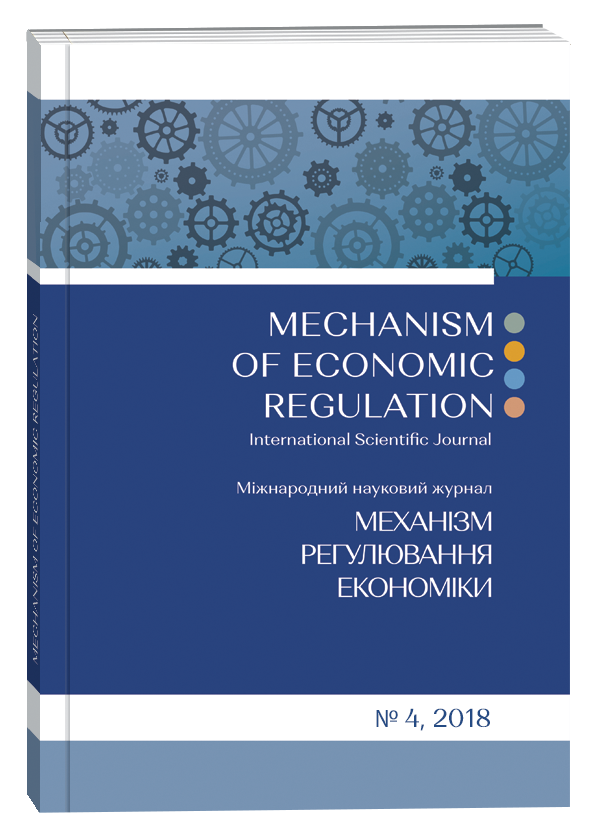STRATEGIC ISSUES OF ENERGY DEVELOPMENT IN UKRAINE: INNOVATION, INTEGRATION AND ENVIRONMENTAL ASPECTS
Abstract
The paper identifies strategic issues for the development of the Ukraine energy sector, the solution of which will improve the efficiency of sector reform. The issues of choosing the strategic direction of the power system development and the economic and technical difficulties associated with this choice are considered. The work's main task is to outline the range of strategic issues for the development of Ukraine's energy sector, which require further thorough research with the aim of eliminating obstacles to the systematic development of the country’s energy sector. According to this aim, the issues of the energy system development in three aspects are considered: innovation – connected with the implementation of innovation activities in the energy sector, including the use of alternative energy sources as part of the modern energy system; integration – taking into account technical and economic effects from the combination of innovative solutions in the energy sector; security – ensuring the national security of the state by achieving energy independence. In particular, the vulnerability of the energy system of Ukraine from the standpoint of the country's economic security was determined. These vulnerabilities are, firstly, dependent on the import of critical energy resources by the structure of consumption and supply of fuel and energy resources, and secondly, the high energy intensity of the economy, which led to low competitiveness of domestic products in the external and internal markets. An analysis of innovation in the energy sector was identified problems of strategic planning of the energy associated with the uncertainty of the future energy system models, and related risks. It considered the value of integration of energy innovation to existing energy system in the implementation of innovation and the importance of the greatest possible use of a combination of innovative solutions to create synergies of their cooperation in order to improve the economic efficiency of innovative projects.
References
Антоненко, С. С. Методика розрахунку системи теплозабезпечення будівель при використанні різних видів енергоресурсів, враховуючи оцінку вартості життєвого циклу таких систем / С. С. Антоненко, С. В. Сапожников, С. О. Хованський, А. К. Черноброва // Управління енергоспоживанням: промисловість і соціальна сфера : монографія / за заг. ред. О. М. Теліженка та М. І. Сотника. – Суми : ВВП «Мрія-1», 2018. – С. 141–185.
Кубатко, О. В. Екологічні інновації як джерело флуктуацій енергоефективного розвитку національної економіки / О. В. Кубатко // Маркетинг і менеджмент інновацій. – 2016. – № 4. – С. 365–376.
Методологія формування механізму інноваційного розвитку національної економіки на основі альтернативної енергетики [Електронний ресурс]. – Режим доступу : https://essuir.sumdu.edu.ua/handle/123456789/67767. (Актуально на 05.12.2018 р.).
Майстро, С. В. Механізми державного регулювання розвитку альтернативної енергетики: теоретичні підходи до визначення та змісту / С. В. Майстро // Ефективність державного управління: збірник наукових праць. – 2015. – Вип. 43. – С. 36–43.
Енергетичний баланс України [Електронний ресурс]. – Режим доступу : http://www.ukrstat.gov.ua/operativ/operativ2012/energ/en_bal/arh_2012.htm. (Актуально на 03.12.2018 р.).
Енергоємність економіки України, або чому до Європи ще далеко [Електронний ресурс]. – Режим доступу :
https://biz.censor.net.ua/columns/3048408/energomnst_ekonomki_ukrani_abo_chomu_do_vropi_sch e_daleko. (Актуально на 01.12.2018 р.).
Доведені запаси нафти і газу в США досягли історичних максимумів [Електронний ресурс]. – Режим доступу : https://www.epravda.com.ua/news/2018/12/2/643190/. (Актуально на 05.12.2018 р.).
2030 Energy Strategy [Electronic resource]. – Accessed mode : https://ec.europa.eu/energy/en/topics/energy-strategy-and-energy-union/2030-energy-strategy . (Актуально на 01.12.2018 р.).
Energy roadmap 2050 [Electronic resource]. – Accessed mode : https://ec.europa.eu/energy/sites/ener/files/documents/2012_energy_roadmap_2050_en_0.pdf. (Available at 01.12.2018).
Directive for the Promotion of the Use of Energy from Renewable Sources, RES [Electronic resource]. – Accessed mode : https://eur-lex.europa.eu/eli/dir/2009/28/oj. (Available at 04.12.2018).
Directive 2012/27/EU of the European Parliament and of the Council of 25 October 2012 on energy efficiency [Electronic resource]. – Accessed mode : https://eur-lex.europa.eu/eli/dir/2012/27/oj. (Available at 01.12.2018).
2012/148/EU Commission Recommendation of 9 March 2012 on preparations for the roll-out of smart metering systems [Electronic resource]. – Accessed mode : https://eur- lex.europa.eu/eli/reco/2012/148/oj. (Available at 01.12.2018).
Strategic Energy Technology Plan [Electronic resource]. – Accessed mode : https://ec.europa.eu/energy/en/topics/technology-and-innovation/strategic-energy-technology-plan. (Available at 05.12.2018).
Сотник, М. І. Стратегії оптимізації витрат на опалення для домогосподарств: випадок України / М. І. Сотник, І. М. Сотник // Управління енергоспоживанням: промисловість і соціальна сфера : монографія / за заг. ред. О. М. Теліженка та М. І. Сотника. – Суми : ВВП «Мрія-1», 2018. – С. 297–322.
MacKay, D. A reality check on renewables [Electronic resource] / D. MacKay. – Accessed mode : https://www.ted.com/talks/david_mackay_a_reality_check_on_renewables#t-181431. (Available at 03.12.2018).
Trent, J. Energy from floating algae pods [Electronic resource] / J. Trent. – Accessed mode : https://www.ted.com/talks/jonathan_trent_energy_from_floating_algae_pods#t-1859. (Available at 01.12.2018).


